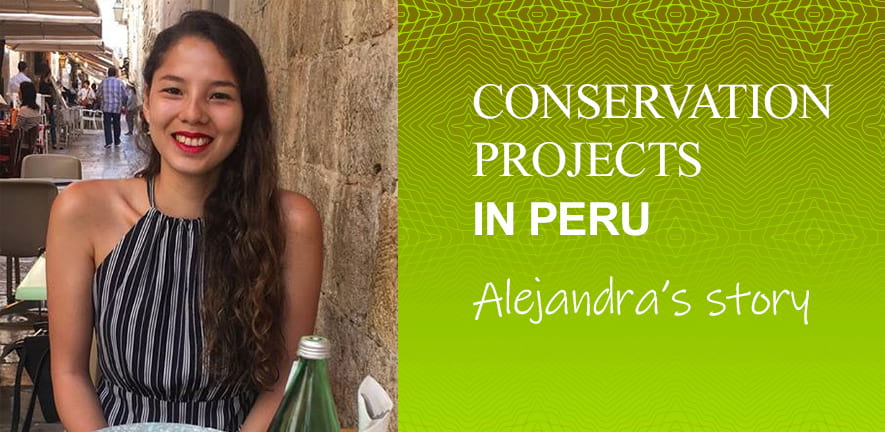Alejandra Pizarro completed an MPhil in Conservation Leadership at Cambridge. Here she discusses working in conservation since
I am 27 years old and am from Lima, Peru.
I finished a BSc in Biology, focusing on Ecology and Conservation, in 2014, from the Universidad Peruana Cayetano Heredia in my home city. After this, I completed an MPhil in Conservation Leadership in 2017-18 at the University of Cambridge. Since 2015, I have worked on several conservation projects – mainly on the management and monitoring of a national park in Peru; on the identification and involvement of stakeholders in a regional IPBES dialogue event in the Caribbean; and on managing a regional project to counter wildlife trafficking in the Andes-Amazon.
After a field trip to the Tambopata National Reserve in Peru when I was 16, I fell in love with the Amazon rainforest.
I decided to study Biology in order to work in conservation research and help maintain that landscape. However, at the same time I became a permanent volunteer for a regional NGO working to end poverty through communal development. This prompted me to merge my passions: taking care of the environment and fighting inequality, so I became interested in conservation projects that have a strong development focus. Eventually, I realised the kind of work I wanted to do is more focused on management and coordination, rather than natural sciences. That has been one big challenge: developing the broad range of skills needed to work in conservation management, rather than my initial training in ecology. Another challenge was to realise that funding is limited and a lot of work has to be done as a volunteer or with little pay. This might make us feel we are lagging behind while friends or family are making a lot of money, but we should never measure ourselves by the amount of money we make.
Do not ignore a vacancy just because the job title sounds strange
My top tip for finding conservation work is to identify the organisations you wish to work for, and make sure you share their core values and agree with the way they carry out their work.
Another tip would be to identify what you wish to do, and read through various job descriptions to check which job titles fit with what you wish to do, or can do. Do not ignore a vacancy just because the job title sounds strange: read through the full job description first! After that, apply to every job for which you fit most of their requirements, even if you do not fit all of them. Often, job descriptions in conservation are very broad and ask for people who can do everything and anything, but some of it you can learn on the job. When applying, refer to all your experiences, including volunteer work or extracurriculars – especially if it involves management and leadership. Working with donors and funding agencies can involve a lot of administrative tasks, and conservation organisations may get caught up in complying with donor requirements, so they really appreciate management skills.
Being sensitive with multiculturality and developing leadership skills such as accountability and team work are key skills
A useful skill to develop when seeking work in conservation is flexibility, since often you will have to do much more than what was initially thought, to carry out the projects.
Another important skill is diplomacy and everything related to people skills, since we often work with a lot of different stakeholders and among different teams. Being sensitive with multiculturality and developing leadership skills such as accountability and team work are key skills as well.
A final thing about me:
My mind is always set on bigger global challenges such as taking care of the environment and fighting inequality, but my favourite hobby is pole dancing! It is the perfect fit between acrobatics and dancing, and it is always a personal challenge.


